Charles E W Bean, Diaries, AWM38 3DRL 606/244/1 - 1916 - 1933 - Part 8
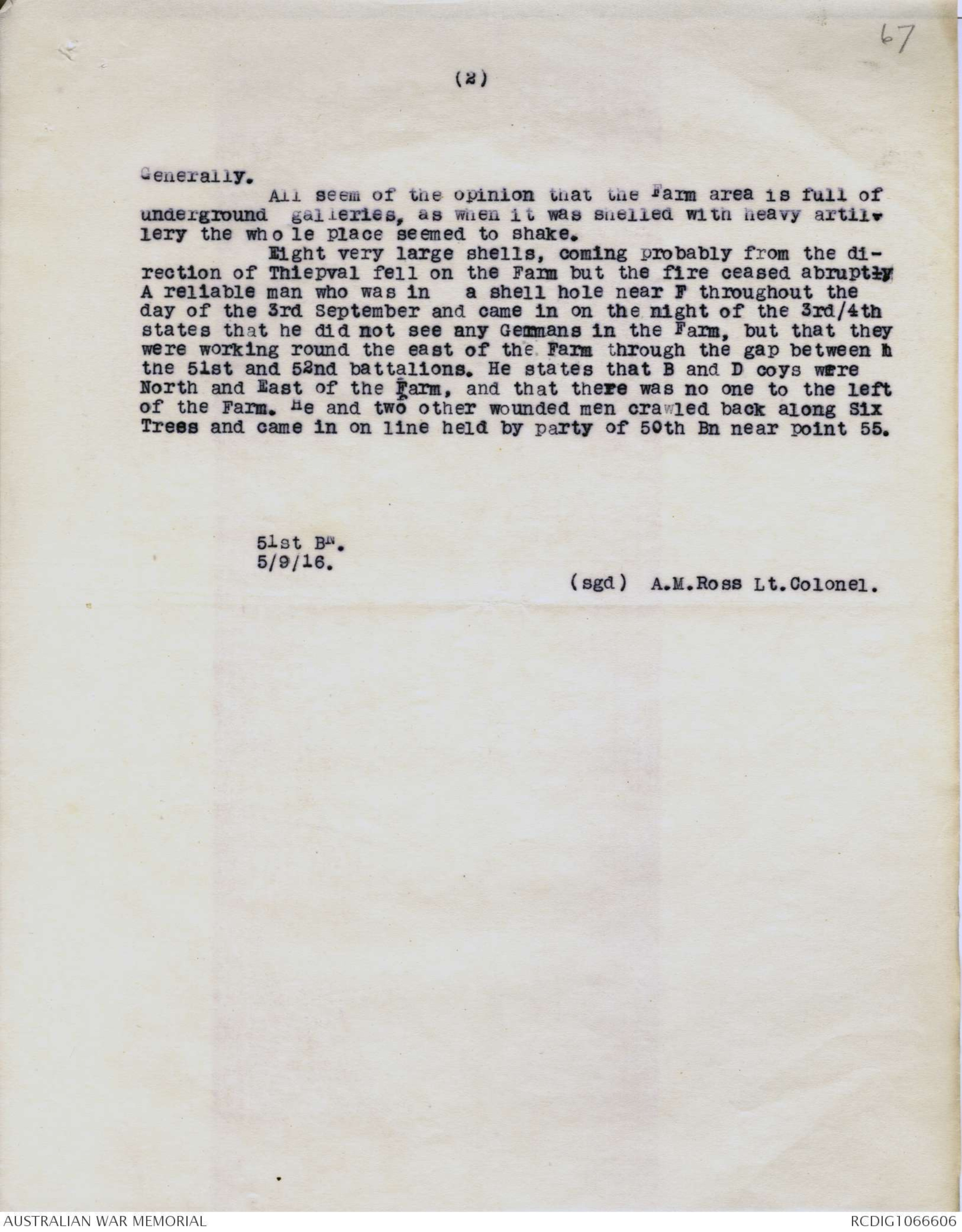
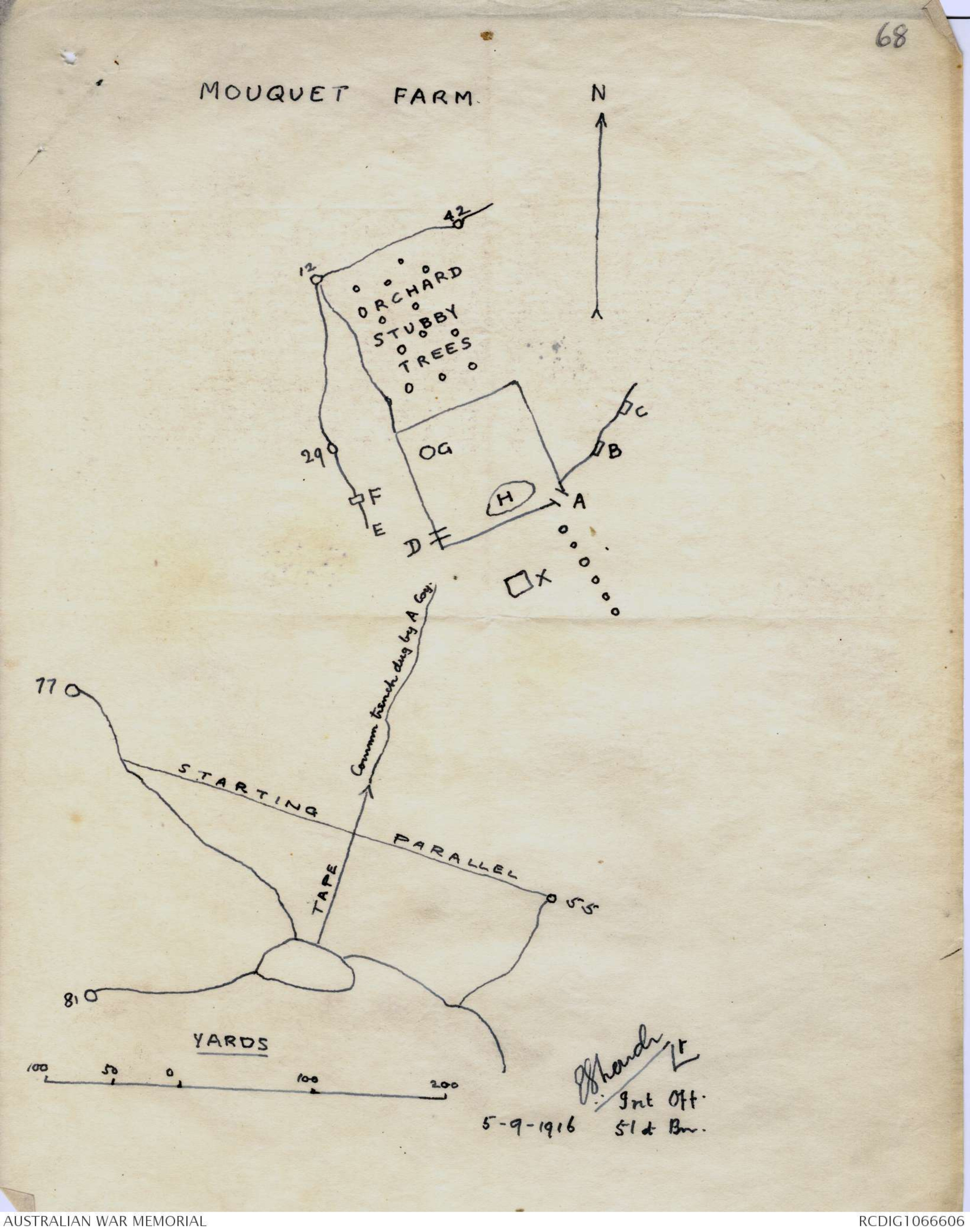
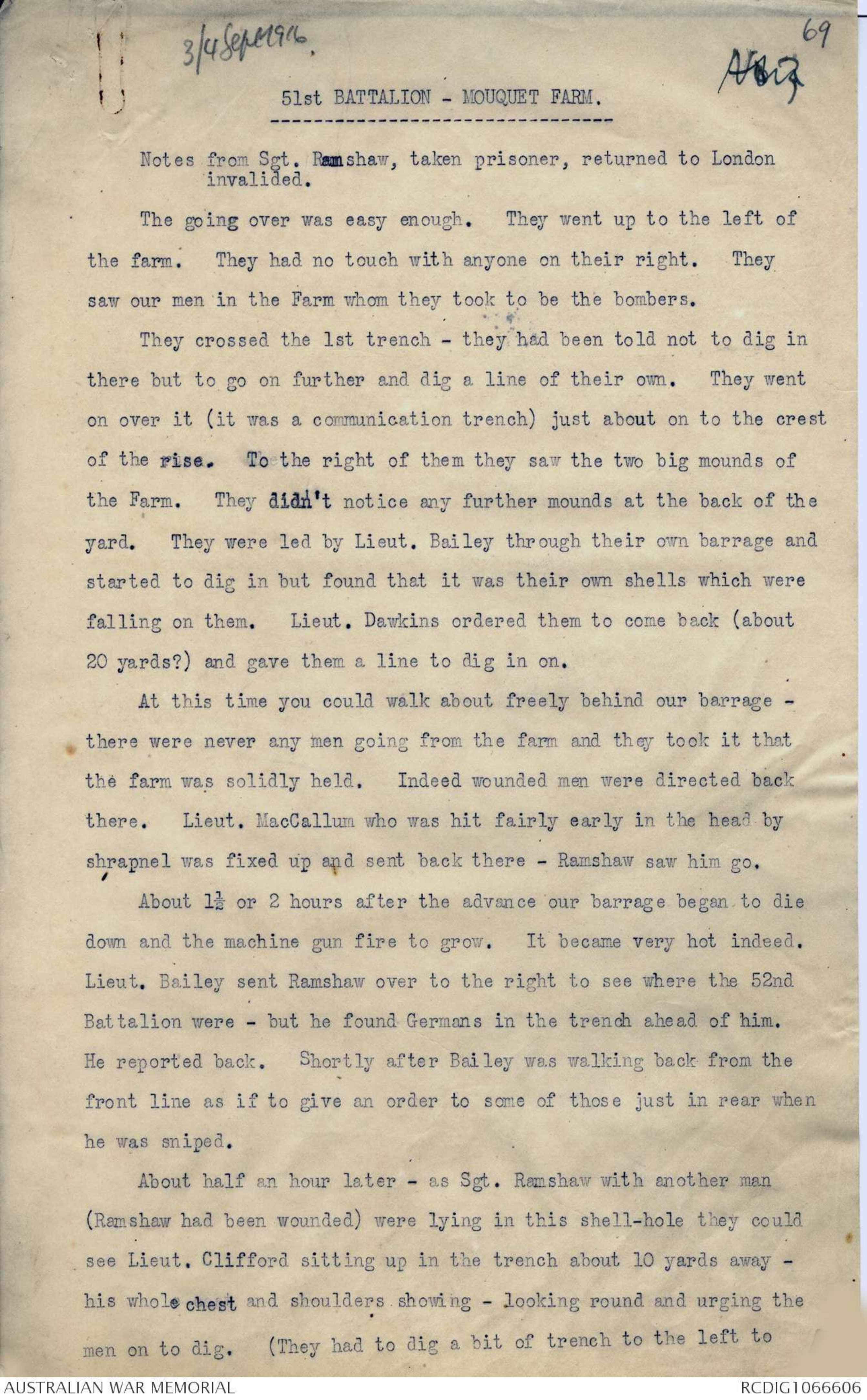
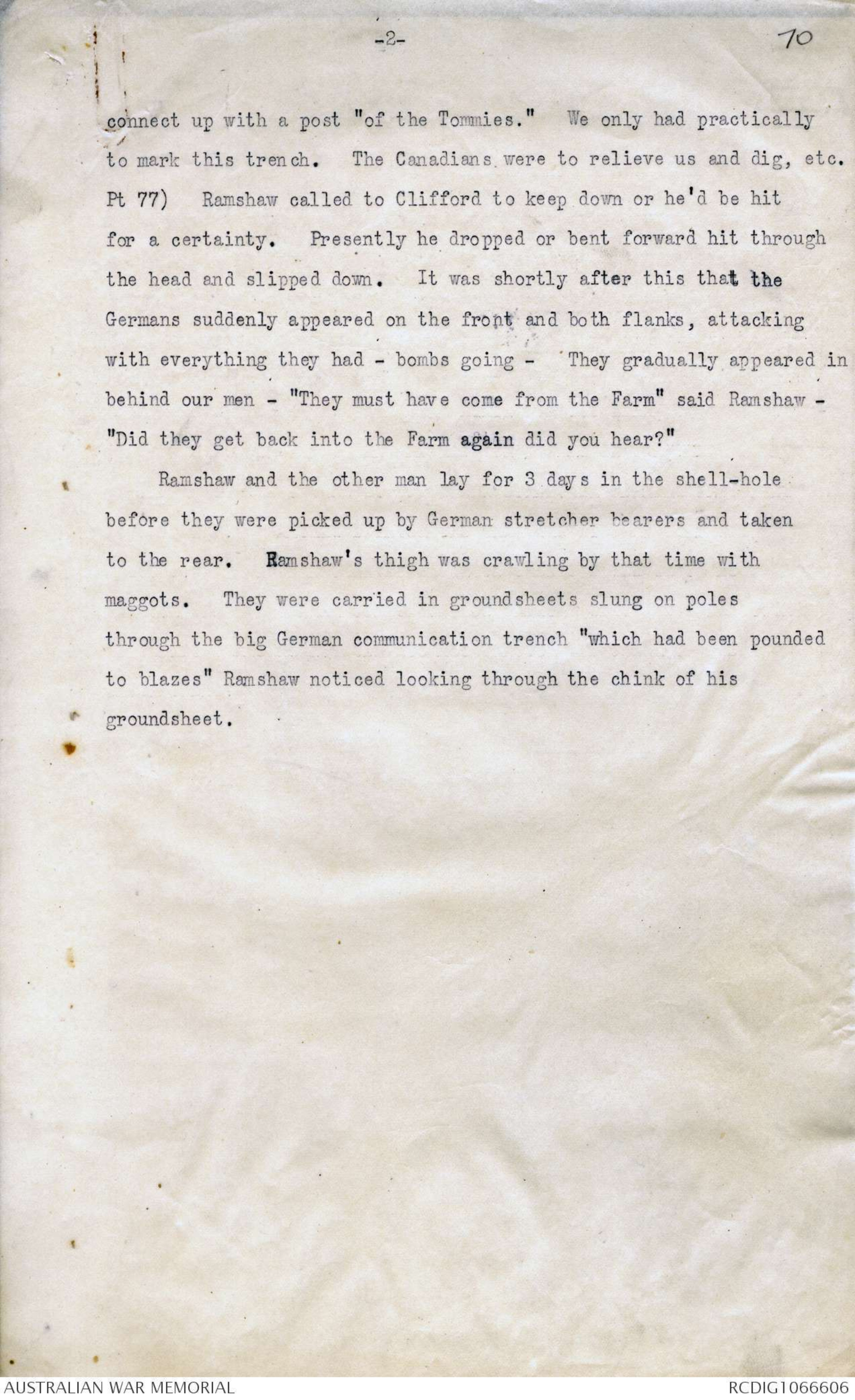
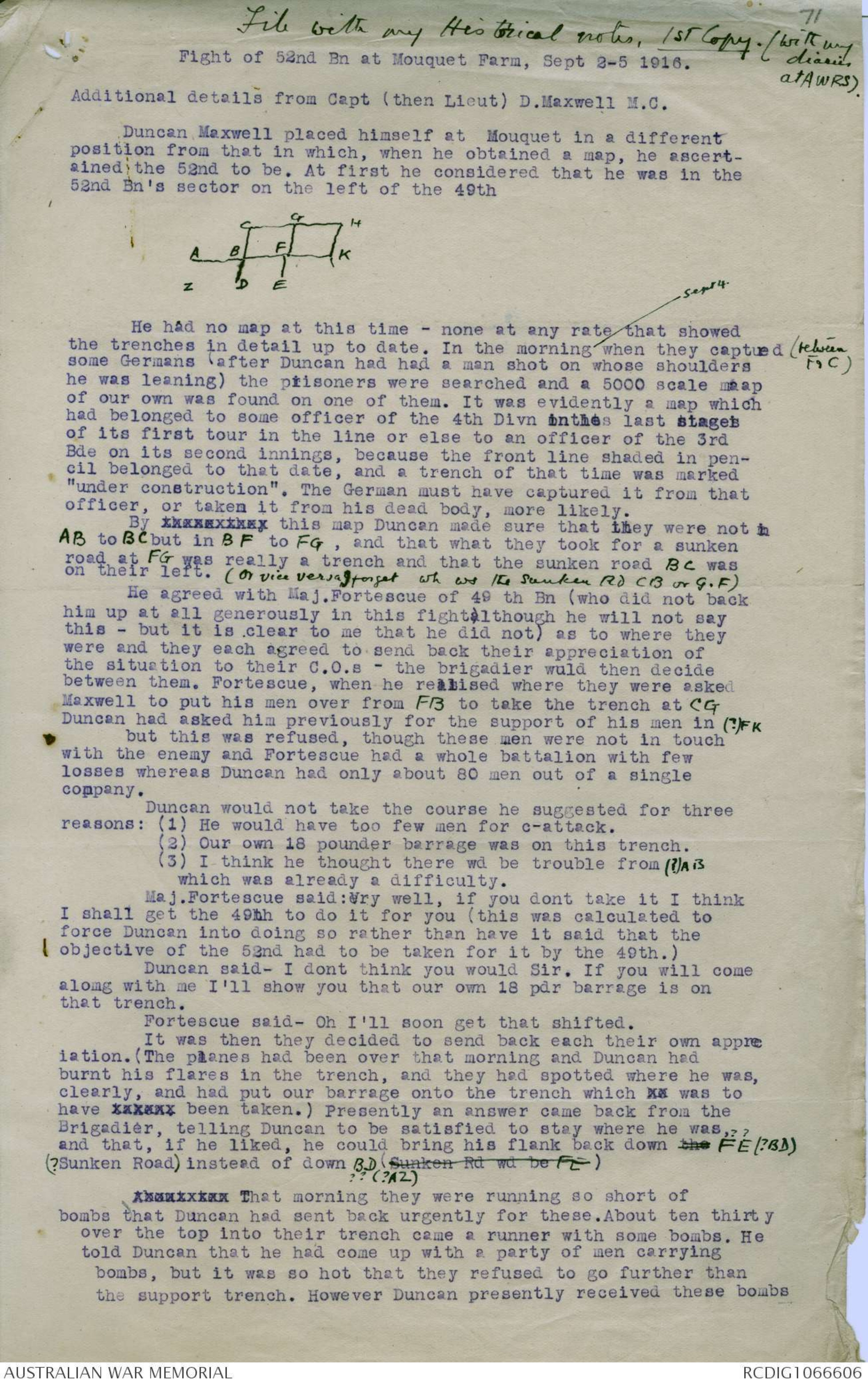
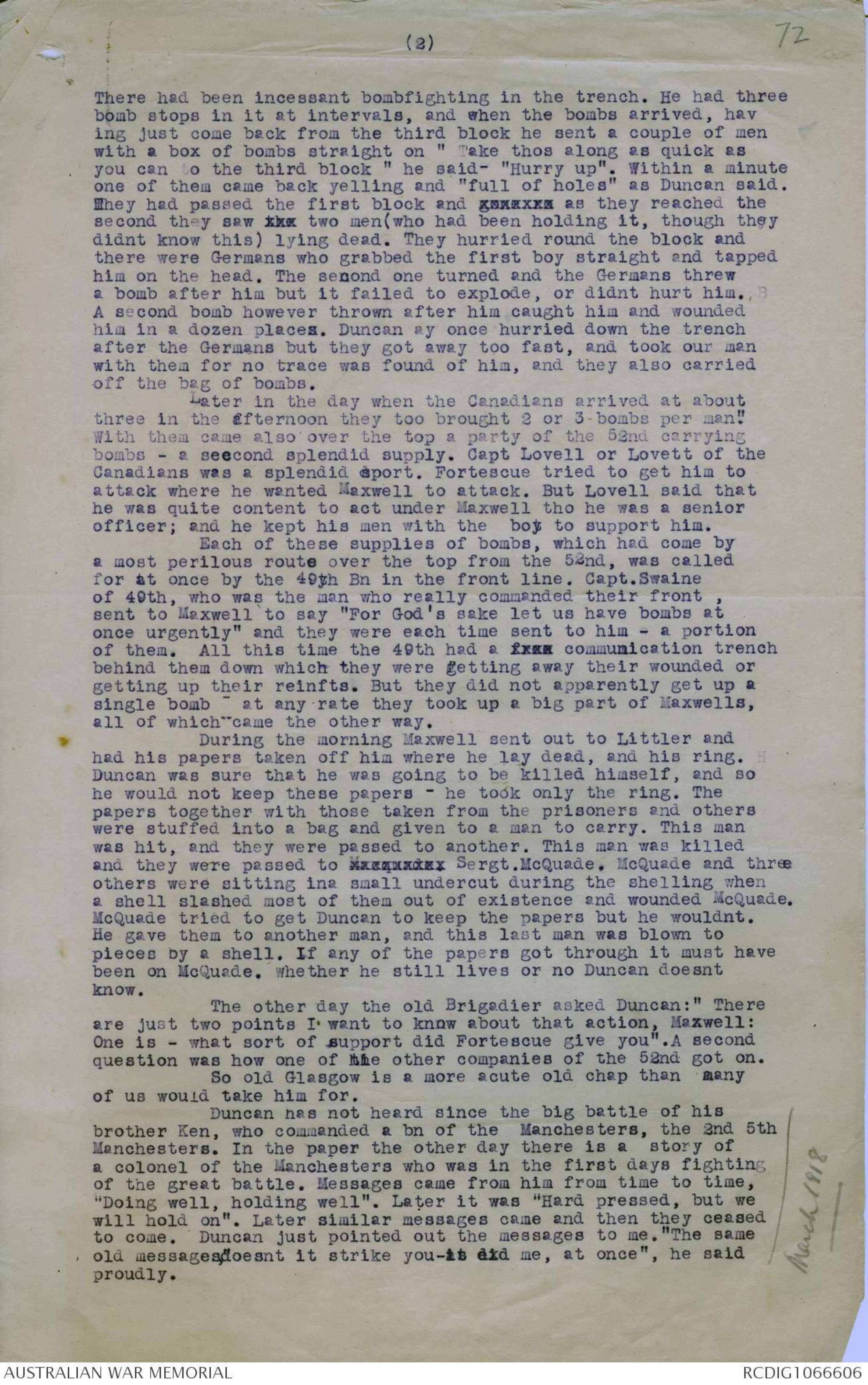
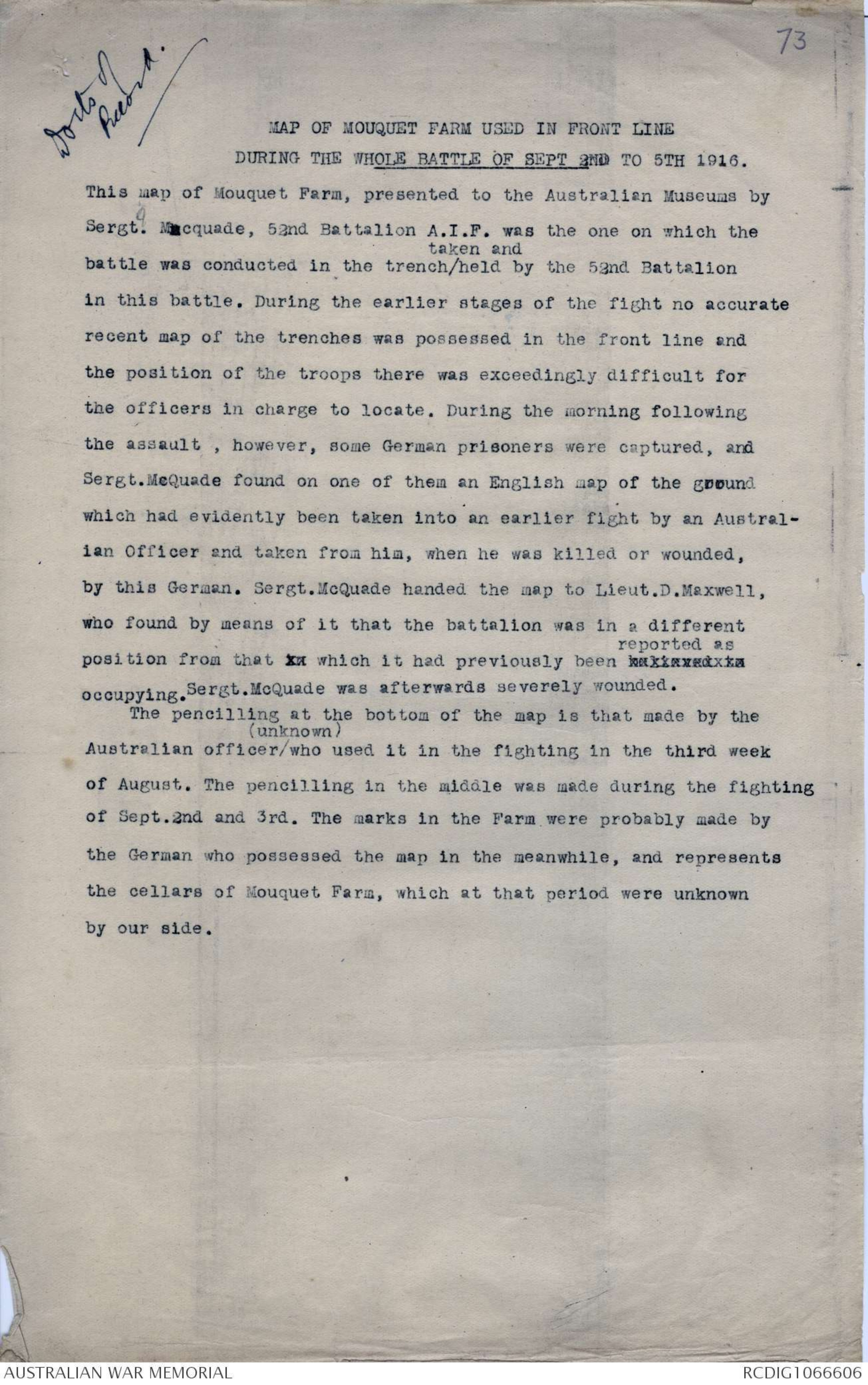
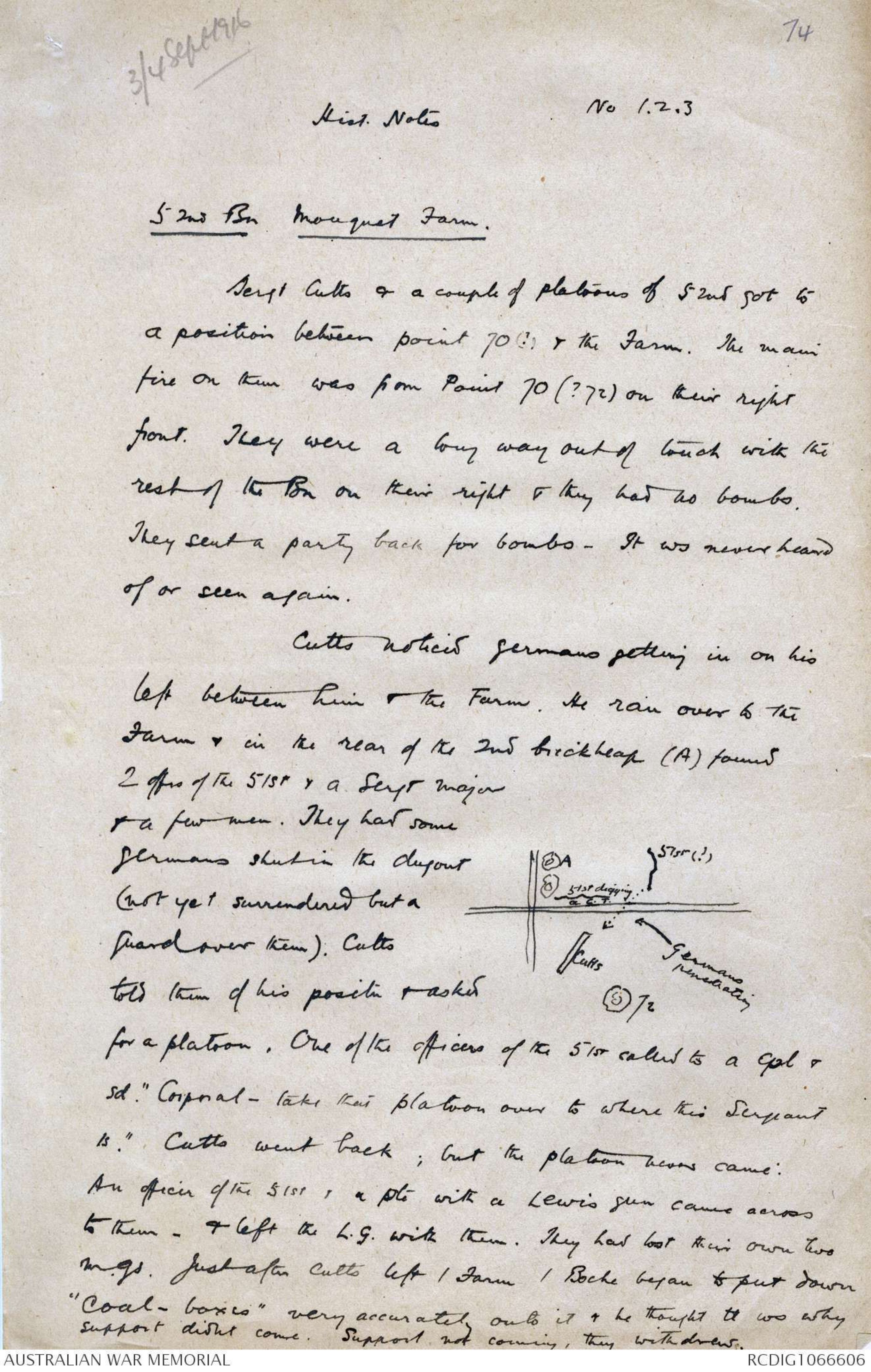
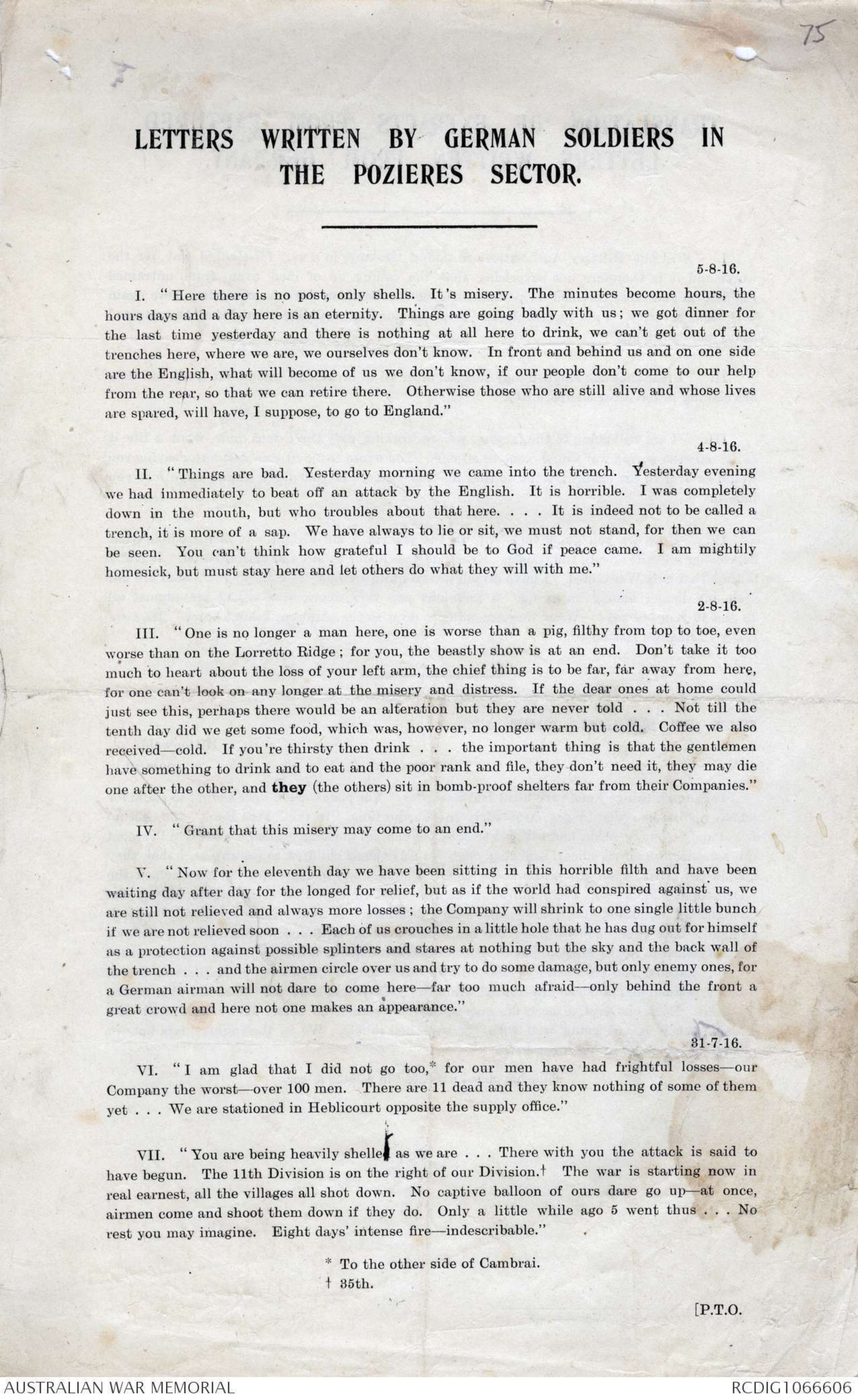
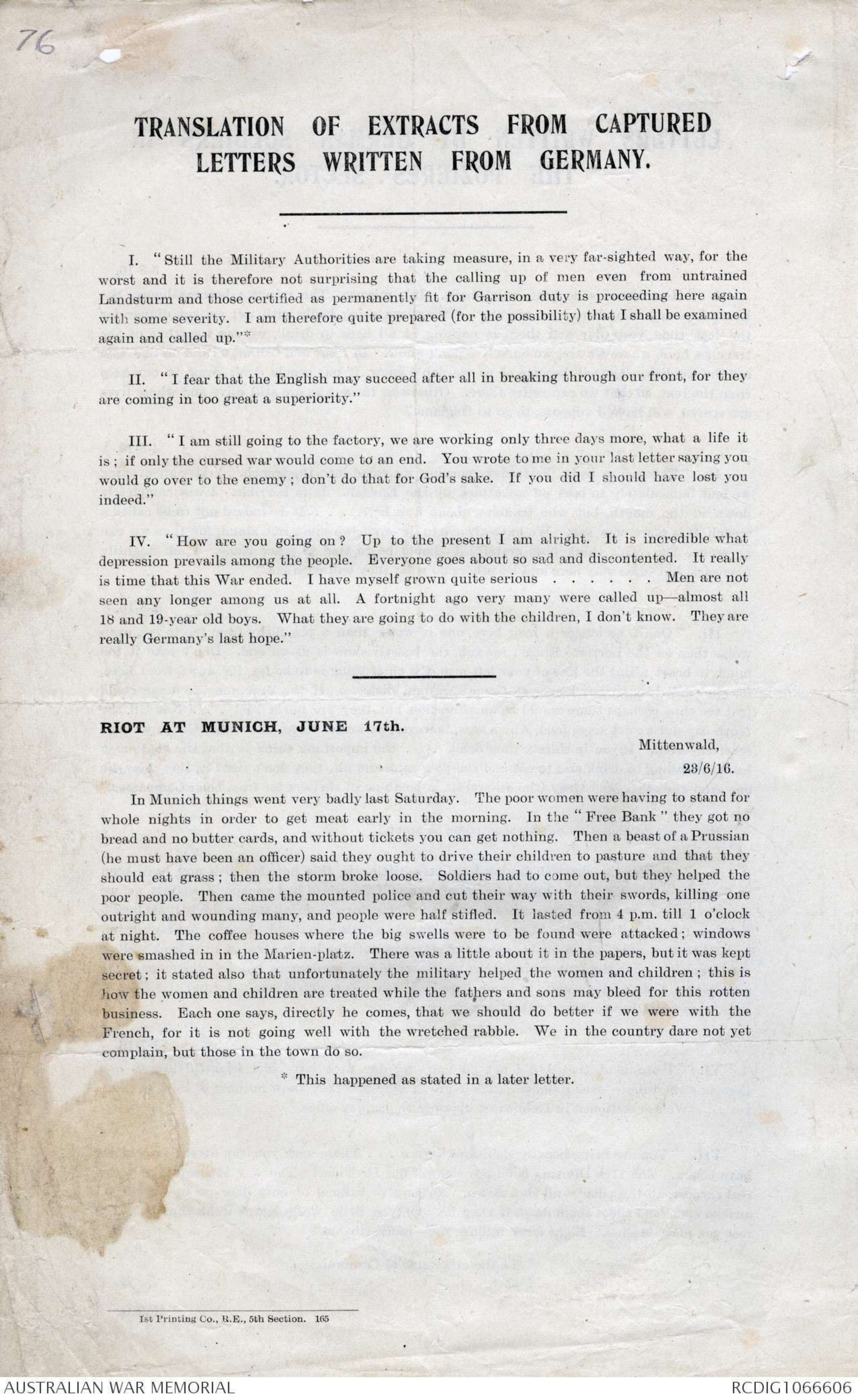
67
(2)
Generally.
All seem of the opinion that the Farm area is full of
underground galleries, as when it was shelled with heavy artillery
the who le place seemed to shake.
Eight very large shells, coming probably from the direction
of Thiepval fell on the Farm but the fire ceased abruptly
A reliable man who was in a shell hole near F throughout the
day of the 3rd September and came in on the night of the 3rd/4th
states that he did not see any Germans in the Farm, but that they
were working round the east of the Farm through the gap between h
the 51st and 52nd battalions. He states that B and D coys were
North and East of the Farm, and that there was no one to the left
of the Farm. He and two other wounded men crawled back along Six
Trees and came in on line held by party of 50th Bn near point 55.
51st BN.
5/9/16.
(sgd) A.M.Ross Lt.Colonel.
68
Hand drawn diagram/map - see original document
69
3/4Sept1916No 3
51st BATTALION - MOUQUET FARM.
Notes from Sgt. Ramshaw, taken prisoner, returned to London
invalided.
The going over was easy enough. They went up to the left of
the farm. They had no touch with anyone on their right. They
saw our men in the Farm whom they took to be the bombers.
They crossed the 1st trench - they had been told not to dig in
there but to go on further and dig a line of their own. They went
on over it (it was a communication trench) just about on to the crest
of the rise. To the right of them they saw the two big mounds of
the Farm. They didn’t notice any further mounds at the back of the
yard. They were led by Lieut. Bailey through their own barrage and
started to dig in but found that it was their own shells which were
falling on them. Lieut. Dawkins ordered them to come back (about
20 yards?) and gave them a line to dig in on.
At this time you could walk about freely behind our barrage -
there were never any men going from the farm and they took it that
the farm was solidly held. Indeed wounded men were directed back
there. Lieut. MacCallum who was hit fairly early in the head by
shrapnel was fixed up and sent back there - Ramshaw saw him go.
About 1½ or 2 hours after the advance our barrage began to die
down and the machine gun fire to grow. It became very hot indeed.
Lieut. Bailey sent Ramshaw over to the right to see where the 52nd
Battalion were - but he found Germans in the trench ahead of him.
He reported back. Shortly after Bailey was walking back from the
front line as if to give an order to some of those just in rear when
he was sniped.
About half an hour later - as Sgt. Ramshaw with another man
(Ramshaw had been wounded) were lying in this shell-hole they could
see Lieut. Clifford sitting up in the trench about 10 yards away -
his whole chest and shoulders showing - looking round and urging the
men on to dig. (They had to dig a bit of trench to the left to
70
-2-
connect up with a post "of the Tommies." We only had practically
to mark this trench. The Canadians were to relieve us and dig, etc.
Pt 77) Ramshaw called to Clifford to keep down or he'd be hit
for a certainty. Presently he dropped or bent forward hit through
the head and slipped down. It was shortly after this that the
Germans suddenly appeared on the front and both flanks, attacking
with everything they had - bombs going - They gradually appeared in
behind our men - "They must have come from the Farm" said Ramshaw -
"Did they get back into the Farm again did you hear?"
Ramshaw and the other man lay for 3 days in the shell-hole
before they were picked up by German stretcher bearers and taken
to the rear. Ramshaw's thigh was crawling by that time with
maggots. They were carried in groundsheets slung on poles
through the big German communication trench "which had been pounded
to blazes" Ramshaw noticed looking through the chink of his
groundsheet.
71
[*File with my Historical notes, 1st Copy.(with my diaries at AWRS).*]
Fight of 52nd Bn at Mouquet Farm, Sept 2-5 1916.
Additional details from Capt (then Lieut) D. Maxwell M.C.
Duncan Maxwell placed himself at Mouquet in a different
position from that in which, when he obtained a map, he ascertained
the 52nd to be. At first he considered that he was in the
52nd Bn's sector on the left of the 49th
Diagram - see original document
He had no map at this time - none at any rate that showed
the trenches in detail up to date. In the morning ^Sept 4 when they captued (between F&C)
some Germans (after Duncan had had a man shot on whose shoulders
he was leaning) the prisoners were searched and a 5000 scale maap
of our own was found on one of them. It was evidently a map which
had belonged to some officer of the 4th Divn in the last stages
of its first tour in the line or else to an officer of the 3rd
Bde on its second innings, because the front line shaded in pencil
belonged to that date, and a trench of that time was marked
"under construction". The German must have captured it from that
officer, or taken it from his dead body, more likely.
By there they this map Duncan made sure that they were not in
AB to BC but in BF to FG, and that what they took for a sunken
road at FG was really a trench and that the sunken road BC was
on their left. (or vice versa I forget wh ws the Sunken Rd CB or G.F)
He agreed with Maj.Fortescue of 49 th Bn (who did not back
him up at all generously in this fight although he will not say
this - but it is clear to me that he did not) as to where they
were and they each agreed to send back their appreciation of
the situation to their C.O.s - the brigadier wuld then decide
between them. Fortescue, when he realised where they were asked
Maxwell to put his men over from FB to take the trench at CG
Duncan had asked him previously for the support of his men in (?)FK
but this was refused, though these men were not in touch
with the enemy and Fortescue had a whole battalion with few
losses whereas Duncan had only about 80 men out of a single
company.
Duncan would not take the course he suggested for three
reasons: (1) He would have too few men for c-attack.
(2) Our own 18 pounder barrage was on this trench.
(3) I think he thought there wd be trouble from (?)AB
which was already a difficulty.
Maj.Fortescue said:Vry well, if you dont take it I think
I shall get the 49th to do it for you (this was calculated to
force Duncan into doing so rather than have it said that the
objective of the 52nd had to be taken for it by the 49th.)
Duncan said- I dont think you would Sir. If you will come
alomg with me I'll show you that our own 18 pdr barrage is on
that trench.
Fortescue said- Oh I'll soon get that shifted.
It was then they decided to send back each their own appreciation.
(The planes had been over that morning and Duncan had
burnt his flares in the trench, and they had spotted where he was,
clearly, and had put our barrage onto the trench which he was to
have xxxxxx been taken.) Presently an answer came back from the
Brigadier, telling Duncan to be satisfied to stay where he was,
and that, if he liked, he could bring his flank back down the FE (?BD)
(?Sunken Road)instead of down BD ??(?AZ) (Sunken Rd wd be FE)Aboutxxxx That morning they were running so short of
bombs that Duncan had sent back urgently for these. About ten thirty
over the top into their trench came a runner with some bombs. He
told Duncan that he had come up with a party of men carrying
bombs, but it was so hot that they refused to go further than
the support trench. However Duncan presently received these bombs
72
(2)
There had been incessant bombfighting in the trench. He had three
bomb stops in it at intervals, and when the bombs arrived, having
just come back from the third block he sent a couple of men
with a box of bombs straight on “ Take thos along as quick as
you can to the third block " he said- "Hurry up". Within a minute
one of them came back yelling and "full of holes" as Duncan said.
They had passed the first block and xxxxxxx as they reached the
second they saw the two men (who had been holding it, though they
didnt know this) lying dead. They hurried round the block and
there were Germans who grabbed the first boy straight and tapped
him on the head. The second one turned and the Germans threw
a bomb after him but it failed to explode, or didnt hurt him.
A second bomb however thrown after him caught him and wounded
him in a dozen places. Duncan ay once hurried down the trench
after the Germans but they got away too fast, and took our man
with them for no trace was found of him, and they also carried
off the bag of bombs.
Later in the day when the Canadians arrived at about
three in the afternoon they too brought 2 or 3 bombs per man".
With them came also over the top a party of the 52nd carrying
bombs - a second splendid supply. Capt Lovell or Lovett of the
Canadians was a splendid sport. Fortescue tried to get him to
attack where he wanted Maxwell to attack. But Lovell said that
he was quite content to act under Maxwell tho he was a senior
officer; and he kept his men with the boy to support him.
Each of these supplies of bombs, which had come by
a most perilous route over the top from the 52nd, was called
for at once by the 49th Bn in the front line. Capt. Swaine
of 49th, who was the man who really commanded their front,
sent to Maxwell to say "For God's sake let us have bombs at
once urgently" and they were each time sent to him - a portion
of them. All this time the 49th had a fxxx communication trench
behind them down which they were getting away their wounded or
getting up their reinfts. But they did not apparently get up a
single bomb at any rate they took up a big part of Maxwells,
all of which came the other way.
During the morning Maxwell sent out to Littler and
had his papers taken off him where he lay dead, and his ring.
Duncan was sure that he was going to be killed himself, and so
he would not keep these papers - he took only the ring. The
papers together with those taken from the prisoners and others
were stuffed into a bag and given to a man to carry. This man
was hit, and they were passed to another. This man was killed
and they were passed to xxxxxxxxx Sergt. McQuade. McQuade and three
others were sitting ina small undercut during the shelling when
a shell slashed most of them out of existence and wounded McQuade.
McQuade tried to get Duncan to keep the papers but he wouldnt.
He gave them to another man, and this last man was blown to
pieces by a shell. If any of the papers got through it must have
been on McQuade. whether he still lives or no Duncan doesnt
know.
The other day the old Brigadier asked Duncan:" There
are just two points I want to know about that action, Maxwell:
One is - what sort of support did Fortescue give you".A second
question was how one of the other companies of the 52nd got on.
So old Glasgow is a more acute old chap than many
of us would take him for.
Duncan has not heard since the big battle of his
brother Ken, who commanded a bn of the Manchesters, the 2nd 5th
Manchesters. In the paper the other day there is a story of
a colonel of the Manchesters who was in the first days fighting
of the great battle. Messages came from him from time to time,
"Doing well, holding well". Later it was "Hard pressed, but we
will hold on". Later similar messages came and then they ceased
to come. Duncan just pointed out the messages to me. "The same
old messages doesnt it strike you-as did me, at once", he said
proudly. [*March 1918*]
73
[*Docts of
Record.*]
MAP OF MOUQUET FARM USED IN FRONT LINE
DURING THE WHOLE BATTLE OF SEPT 2ND TO 5TH 1916.
This map of Mouquet Farm, presented to the Australian Museums by
Sergt. MxcQuade, 52nd Battalion A.I.F. was the one on which the
battle was conducted in the trench ^taken and held by the 52nd Battalion
in this battle. During the earlier stages of the fight no accurate
recent map of the trenches was possessed in the front line and
the position of the troops there was exceedingly difficult for
the officers in charge to locate. During the morning following
the assault, however, some German prisoners were captured, and
Sergt.McQuade found on one of them an English map of the ground
which had evidently been taken into an earlier fight by an Australian
Officer and taken from him, when he was killed or wounded,
by this German. Sergt.McQuade handed the map to Lieut.D.Maxwell,
who found by means of it that the battalion was in a different
position from that in which it had previously been xxxxxxxxxto reported as
occupying. Sergt. McQuade was afterwards severely wounded.
The pencilling at the bottom of the map is that made by the
Australian officer^(unknown) who used it in the fighting in the third week
of August. The pencilling in the middle was made during the fighting
of Sept.2nd and 3rd. The marks in the Farm were probably made by
the German who possessed the map in the meanwhile, and represents
the cellars of Mouquet Farm, which at that period were unknown
by our side.
74
3/4 Sept 1916
Hist. Notes No 1.2.3
52nd Bn Mouquet Farm.
Sergt Cutts & a couple of platoons of 52nd got to
a position between point 70 (?) & the Farm. The main
fire on them was from Point 70 (?72) on their right
front. They were a long way out of touch with the
rest of the Bn on their right & they had no bombs.
They sent a party back for bombs - It was never heard
of or seen again.
Cutts noticed Germans getting in on his
left between him & the Farm. He ran over to the
Farm & in the rear of the 2nd brickheap (A) found
2 offrs of the 51st & a Sergt Major
& a few men. They had some
Germans shut in the dugout
Diagram - see original document
(not yet surrendered but a
guard over them). Cutts
told them of his positn & asked
for a platoon. One of the officers of the 51st called to a Cpl &
sd." Corporal - take that platoon over to where this Sergeant
is." Cutts went back; but the platoon never came.
An officer of the 51st, a pte with a Lewis gun came across
to them - & left the L.G. with them. They had lost their own two
m.gs. Just after Cutts left / Farm / Boche began to put down
"Coal-boxes" very accurately on to it & he thought tt ws why
support didn't come. Support not coming, they withdrew.
75
LETTERS WRITTEN BY GERMAN SOLDIERS IN
THE POZIERES SECTOR.
5.8-16.
I. "Here there is no post, only shells. It's misery. The minutes become hours, the
hours days and a day here is an eternity. Things are going badly with us; we got dinner for
the last time yesterday and there is nothing at all here to drink, we can't get out of the
trenches here, where we are, we ourselves don't know. In front and behind us and on one side
are the English, what will become of us we don't know, if our people don't come to our help
from the rear, so that we can retire there. Otherwise those who are still alive and whose lives
are spared, will have, I suppose, to go to England."
4.8-16.
II. "Things are bad. Yesterday morning we came into the trench. Yesterday evening
we had immediately to beat off an attack by the English. It is horrible. I was completely
down in the mouth, but who troubles about that here. . . . It is indeed not to be called a
trench, it is more of a sap. We have always to lie or sit, we must not stand, for then we can
be seen. You can't think how grateful I should be to God if peace came. I am mightily
homesick, but must stay here and let others do what they will with me."
2.8.16.
III. "One is no longer a man here, one is worse than a pig, fithy from top to toe, even
worse than on the Lorretto Ridge; for you, the beastly show is at an end. Don't take it too
much to heart about the loss of your left arm, the chief thing is to be far, far away from here,
for one can't look on any longer at the misery and distress. If the dear ones at home could
just see this, perhaps there would be an alteration but they are never told . . . Not till the
tenth day did we get some food, which was, however, no longer warm but cold. Coffee we also
received- cold. If you're thirsty then drink . . . the important thing is that the gentlemen
have something to drink and to eat and the poor rank and file, they don't need it, they may die
one after the other, and they (the others) sit in bomb-proof shelters far from their Companies."
IV. "Grant that this misery may come to an end."
V. "Now for the eleventh day we have been sitting in this horrible filth and have been
waiting day after day for the longed for relief, but as if the world had conspired against us, we
are still not relieved and always more losses; the Company will shrink to one single little bunch
if we are not relieved soon. . . . Each of us crouches in a little hole that he has dug out for himself
as a protection against possible splinters and stares at nothing but the sky and the back wall of
the trench . . . and the airmen circle over us and try to do some damage, but only enemy ones, for
a German airman will not dare to come here - far too much afraid- only behind the front a
great crowd and here not one makes an appearance."
31-7-16.
VI. "I am glad that I did not go too,* for our men have had frightful losses-our
Company the worst- over 100 men. There are 11 dead and they know nothing of some of them
yet . . . We are stationed in Heblicourt opposite the supply office."
VII. "You are being heavily shelled as we are . . . There with you the attack is said to
have begun. The 11th Division is on the right of our Division.‡ The war is starting now in
real earnest, all the villages all shot down. No captive balloon of ours dare go up- at once,
airmen come and shoot then down if they do. Only a little while ago 5 went thus . . . No
rest you may imagine. Eight days' intense fire - indescribable."
*To the other side of Cambrai.
‡35th.
[PTO.
76
TRANSLATION OF EXTRACTS FROM CAPTURED
LETTERS WRTTEN FROM GERMANY.
I. "Still the Military Authorities are taking measure, in a very far-sighted way, for the
worst and it is therefore not surprising that the calling up of men even from untrained
Landsturm and those certified as permanently fit for Garrison duty is proceeding here again
with some severity. I am therefore quite prepared (for the possibility) that I shall be examined
again and called up."*
II. "I fear that the English may succeed after all in breaking through our front, for they
are coming in too great a superiority."
III. "I am still going to the factory, we are working only three days more, what a life it
is; if only the cursed war would come to an end. You wrote to me in your last letter saying you
would go over to the enemy; don't do that for God's sake. If you did I should have lost you
indeed."
IV. "How are you going on? Up to the present I am alright. It is incredible what
depression prevails among the people. Everyone goes about so sad and discontented. It really
is time that this War ended. I have myself grown quite serious . . . . . . Men are not
seen any longer among us at all. A fortnight ago very many were called up-almost all
18 and 19 year old boys. What they are going to do with the children, I don't know. They are
really Germany's last hope."
RIOT AT MUNICH, JUNE 17th.
Mittenwald,
23/6/16.
In Munich things went very badly last Saturday. The poor women were having to stand for
whole nights in order to get meat early in the morning. In the "Free Bank" they got no
bread and no butter cards, and without tickets you can get nothing. Then a beast of a Prussian
(he must have been an officer) said they ought to drive their children to pasture and that they
should eat grass; then the storm broke loose. Soldiers had to come out, but they helped the
poor people. Then came the mounted police and cut their way with their swords, killing one
outright and wounding many, and people were half stifled. It lasted from 4 p.m. till 1 o'clock
at night. The coffee houses where the big swells were to be found were attacked; windows
were smashed in in the Marien-platz. There was a little about it in the papers, but it was kept
secret; it stated also that unfortunately the military helped the women and children; this is
how the women and children are treated while the fathers and sons may bleed for this rotten
business. Each one says, directly he comes, that we should do better if we were with the
French, for it is not going well with the wretched rabble. We in the country dare not yet
complain, but those in the town do so.
*This happened as stated in a later letter.
1st Printing Co., R.E., 5th Section. 165
 Sam scott
Sam scottThis transcription item is now locked to you for editing. To release the lock either Save your changes or Cancel.
This lock will be automatically released after 60 minutes of inactivity.